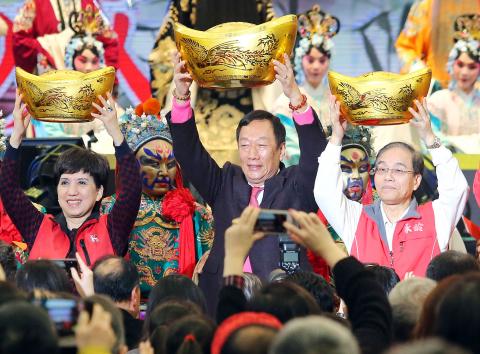Hon Hai Precision Industry Co (鴻海精密) chairman Terry Gou (郭台銘) yesterday said he is confident of the firm’s offer for Sharp Corp and expects the Japanese company to reach a final decision before Friday.
“I am very confident. The [Japanese] government said it has not stepped into the deal and would let the board of Sharp to make its own decision. Plus, we think our terms are much better than other competitors’,” Gou told reporters on the sidelines of Hon Hai’s annual charity carnival at the National Taiwan University Sports Center in Taipei.
Gou returned to Taipei on Saturday night after a two-and-a-half-hour meeting with Sharp’s board of directors in Osaka.

Photo: CNA
He declined to confirm if Hon Hai, known as Foxconn Technology Group (富士康) outside Taiwan, has offered to take over Sharp with ¥625 billion (US$5.16 billion), saying a non-disclosure agreement bars him from discussing the amount of the proposed offer.
Officials from Hon Hai’s rival for Sharp, Innovation Network Corp of Japan (INCJ), were also schedule to visit Sharp on Saturday to discuss its offer, according to Jiji Press.
INCJ is reportedly willing to provide a capital injection of more than ¥300 billion, according to the Nikkei Shimbun and Reuters.
Gou said he expected Sharp’s board will make a decision this week.
There has been speculation that Sharp might announce its decision on Thursday, when it is to release its latest quarterly results for last quarter.
“I told the [Sharp] board members that I am not just bringing capital. I am bringing a corporate culture of sharing benefits with employees and an entrepreneurial spirit to the company,” Gou said.
He said Hon Hai’s planned investment would not affect Sharp’s brand, management or employees.
“We do not want to destroy or combine the company. We want to keep it for another 100 years. We do not want to integrate it into our company. Otherwise, we might lose talent to [South] Korea, China or somewhere else,” he said.
Though Hon Hai is offering more money, Sharp is reportedly leaning toward a deal with INCJ to keep its technology within Japan, wire agency reports have said.
Gou did not comment on such speculation.
He said INCJ does not represent the Japanese government, even though it handles the government’s investment funds.
Gou said INCJ is a private corporation that helps the Japanese government to lend support to companies with critical finance.
“We are not competing against the Japanese government,” he said.
Gou said he has met some “very” high-ranking Japanese government officials and was told that Tokyo welcomes technological cooperation between Taiwan and Japan.
“Our case could be an important example of a collaboration between Taiwan and Japan,” he said.
Analysts are mixed about Hon Hai’s bid, as it would be good in terms of technological advancement, but raises financial concerns.
“We believe Hon Hai is eyeing up Sharp’s indium gallium zinc oxide technology, which can be applied to manufacture active-matrix organic light-emitting diode displays, which are reportedly to be adopted in the iPhone 8,” Yuanta Securities Corp (元大證券) analyst Vincent Chen (陳豐丰) said in a note yesterday.
“However, if Hon Hai really does acquire Sharp, we believe it may not be beneficial for Hon Hai finance-wise, as Sharp has total debt of ¥1,039 billion — or up to NT$287 billion [US$8.53 billion],” Chen said.

Intel Corp chief executive officer Lip-Bu Tan (陳立武) is expected to meet with Taiwanese suppliers next month in conjunction with the opening of the Computex Taipei trade show, supply chain sources said on Monday. The visit, the first for Tan to Taiwan since assuming his new post last month, would be aimed at enhancing Intel’s ties with suppliers in Taiwan as he attempts to help turn around the struggling US chipmaker, the sources said. Tan is to hold a banquet to celebrate Intel’s 40-year presence in Taiwan before Computex opens on May 20 and invite dozens of Taiwanese suppliers to exchange views

Application-specific integrated circuit designer Faraday Technology Corp (智原) yesterday said that although revenue this quarter would decline 30 percent from last quarter, it retained its full-year forecast of revenue growth of 100 percent. The company attributed the quarterly drop to a slowdown in customers’ production of chips using Faraday’s advanced packaging technology. The company is still confident about its revenue growth this year, given its strong “design-win” — or the projects it won to help customers design their chips, Faraday president Steve Wang (王國雍) told an online earnings conference. “The design-win this year is better than we expected. We believe we will win

Chizuko Kimura has become the first female sushi chef in the world to win a Michelin star, fulfilling a promise she made to her dying husband to continue his legacy. The 54-year-old Japanese chef regained the Michelin star her late husband, Shunei Kimura, won three years ago for their Sushi Shunei restaurant in Paris. For Shunei Kimura, the star was a dream come true. However, the joy was short-lived. He died from cancer just three months later in June 2022. He was 65. The following year, the restaurant in the heart of Montmartre lost its star rating. Chizuko Kimura insisted that the new star is still down

While China’s leaders use their economic and political might to fight US President Donald Trump’s trade war “to the end,” its army of social media soldiers are embarking on a more humorous campaign online. Trump’s tariff blitz has seen Washington and Beijing impose eye-watering duties on imports from the other, fanning a standoff between the economic superpowers that has sparked global recession fears and sent markets into a tailspin. Trump says his policy is a response to years of being “ripped off” by other countries and aims to bring manufacturing to the US, forcing companies to employ US workers. However, China’s online warriors